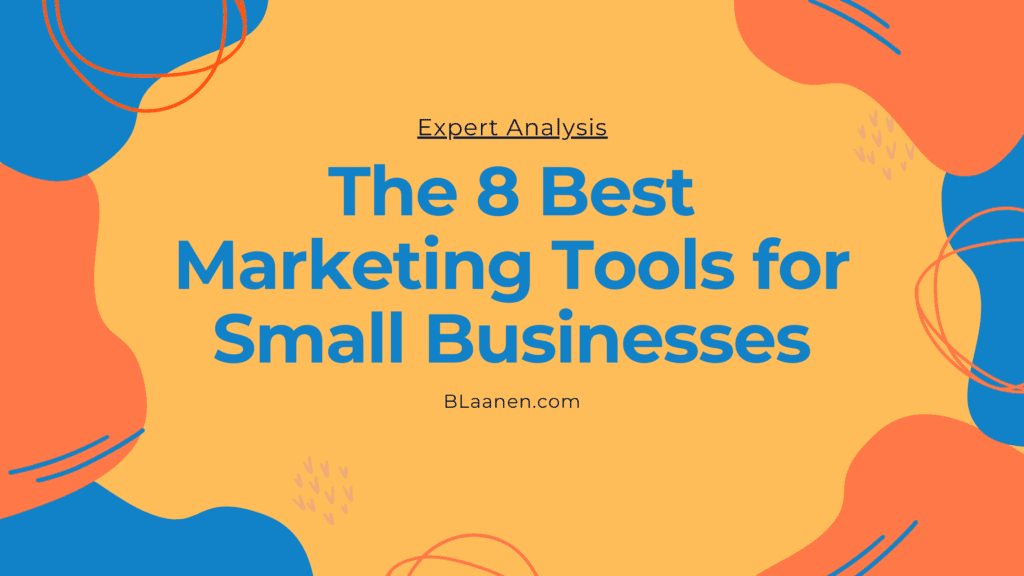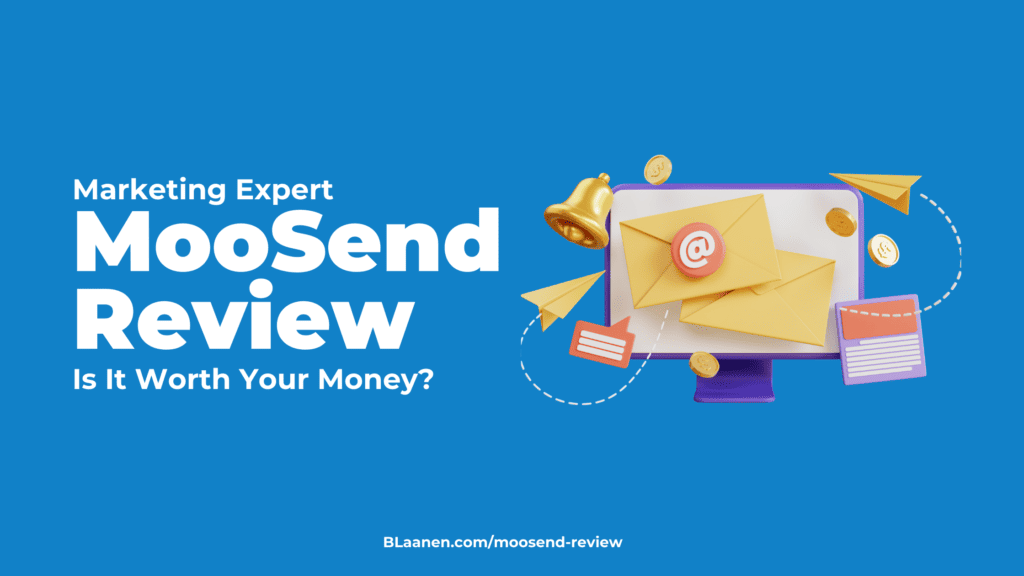Small business owners need the right marketing tools for a long-term winning strategy. This is especially true today with so much business being done online. With this ever-expanding 24/7 global online market, competition is fiercer than ever.
According to Entrepreneur, 20% of small businesses fail within the first year. And this number increases year after year. But there’s a plethora of powerful marketing tools for small businesses to take advantage of. By using them, they can increase their chances of success.
With so many marketing tools in many categories, it can be difficult to find one that suits your needs. Still, some marketing tools help small businesses manage everything from social media marketing to email marketing and analytics.
As a small business owner, it’s imperative you’re equipped with the right marketing tools. With the right marketing tools, you can level the playing field. By using the right tools coupled with a sound marketing strategy, your small business will be able to compete with major players.
In this blog, I discuss in detail the eight best marketing tools for small businesses. When you get to the end, you’ll be equipped with the right knowledge to decide which is the right tool for your small business.
Table of Contents
ToggleHow Do I Know Which Marketing Tools To Use?
Small business marketing tools come in many varieties. To know which marketing tools suit you best, you should first identify the necessities of your business.
Are you a small business that’s online-based and plans to push your products through social media posts? Perhaps you’re a small business with a large team and need effective organization and management. Make a list of how you plan to conduct your marketing efforts. Once you do this, you’ll better understand what marketing tools you need.
While there are thousands of digital marketing tools available, less is more. One can be easily overwhelmed trying to use various different marketing software. Many of them are expensive. Using only what you need lets you keep costs down, streamline your processes and increase efficiency.
A good rule of thumb is to use one marketing software tool per category per your needs. For example, if you are going to unleash an incredible email marketing campaign but don’t have a big enough team to need collaboration marketing software, then you’d only need marketing software for the former.
What is Digital Marketing?
Digital marketing is an umbrella term for any marketing that uses electronic devices or software. Since the internet boom, digital marketing has gone from strength to strength. Today, digital marketing is a common term used in many online spheres.
Most businesses operate online today to be able to compete. Businesses of all kinds, including small businesses, need quality digital marketing if they want to succeed. Digital marketing typically refers to marketing campaigns aimed at customers electronically. This includes appearing on computers, phones, tablets, and the like.
Unlike traditional marketing, digital marketing encompasses many major areas necessary to compete online today. This includes email marketing, social media marketing, content marketing, and more. These marketing avenues can take many forms. This can include online video, display ads, search engine marketing, paid social ads and social media posts.
Digital Marketing Tools Are Critical For Any Online Business
We know what digital marketing is. But what about digital marketing tools, and how can they help small businesses succeed?
A digital marketing tool is a piece of software that works to benefit a business’s digital marketing strategy. These tools allow marketers and businesses to analyze, measure and test their digital marketing strategies. They help businesses facilitate the promotion and growth of their products and services online. And they help teams better organize, build and scale their business.
There are digital marketing tools for every type of digital marketing. This includes a wide variety of different marketing categories. There are tools for social media marketing, email marketing, analytics and reporting, communications and teams, SEO (search engine optimization) and more. There are also digital marketing tools that act as complete suites. These platforms bring many of these different tools into one platform.
Types of Digital Marketing Tools
There are thousands of digital marketing tools available. As a result, identifying and choosing the most suitable marketing software tools for your small business’s specific requirements is vital. This is why it’s crucial every small business first understands the types of digital marketing tools, what they do and how they can help their business.
Here are some of the major digital marketing tools categories we’ll talk about:
- Social media marketing tools aid in effective marketing on social media channels.
- Email marketing tools raise email marketing efforts by creating email marketing campaigns and more.
- Analytics and reporting tools gather data and key metrics for businesses. This allows the analysis and improvement of their marketing strategy.
These marketing tools categories often cross, with some tools being geared towards complete suites. Some are more specialized for specific purposes. While most of the best digital marketing tools for small businesses are paid, many are free. Know, too, that some of them also include free trials. This lets you see if the tool works well for your business before investing.
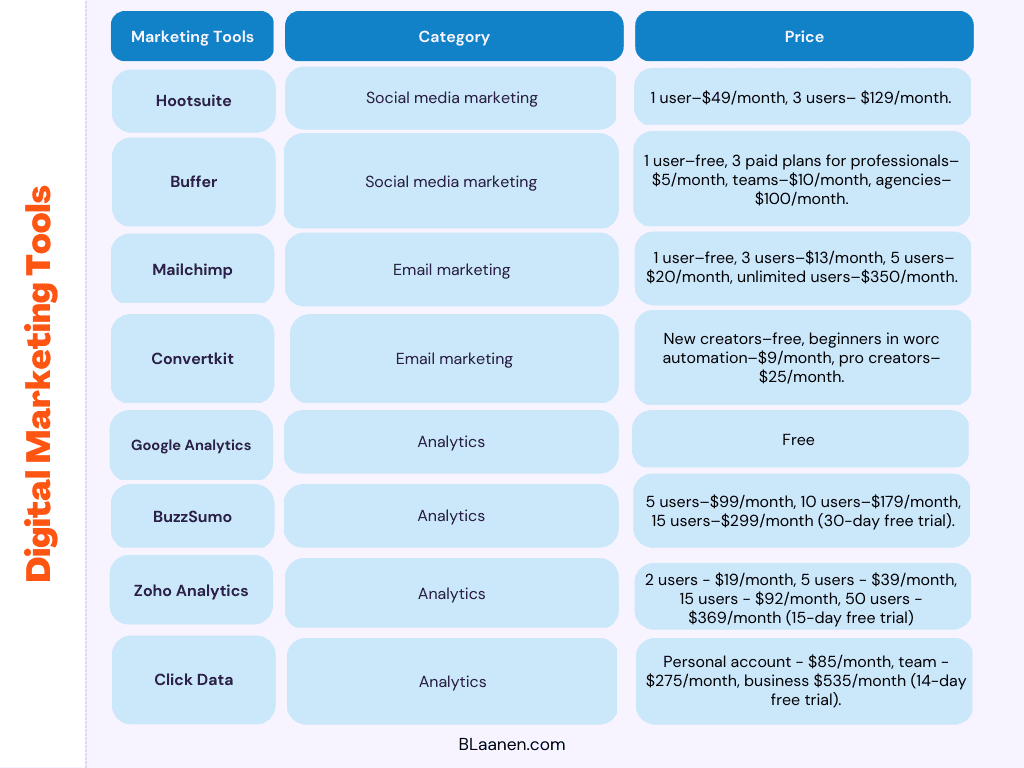
Best Social Media Marketing Tools
Social media marketing today is an important aspect of a marketing strategy. In recent years, social media platforms have been catering to marketers because of how powerful they are. The breadth of opportunity and potential reach is limitless.
Some of the best reasons to use social media marketing are:
- Builds brand awareness and recognition.
- Helps you understand your audience’s interactions with your business.
- Generates conversation around your brand.
- Helps drive traffic for higher numbers of website visitors.
- Enables prompt and efficient 24/7 customer service.
Pro Tips
For the best use of these tools, use one that encompasses everything you need it for. Use those that fit your needs without the extras. Unnecessary extras can be costly and bog you down. Make sure to read the plans and decide which tier best suits your small business.
Here are my top picks for the best social media marketing tools for small businesses.
1. Hootsuite
Hootsuite encompasses all the major components of great social media marketing. This tool is an industry leader that’s easy to use, intuitive and effective.

Hootsuite is the all-in-one package that many marketers use to take care of their social media management. Hootsuite goes beyond posting, collaboration and scheduling. On top of these features, this suite will also help you pull key performance data and vital analytics data.
It’s a great platform for small businesses in particular. With Hootsuite, scheduling posts for multiple accounts is easy to manage. Hootsuite also offers a plethora of integrations. This is one of its greatest features. With Hootsuite’s open-source range of integrations, you can add a variety of integrative tools. Some of these include customer relationship management (CRM) tools, security tools and publishing and creation tools.
Overall Hootsuite is a fantastic, comprehensive social network marketing tool that works with all major social media platforms.
Pros:
- Create, schedule and publish social media posts.
- Manage various social media channels from one intuitive dashboard.
- Get real-time insights and analytics.
- Maximize the impact of your social media campaigns.
- A vast number of integrations to choose from.
- Works with all major social networking platforms.
Cons:
- Integrations can add up to become rather expensive.
- Most powerful features are reserved for the enterprise plan.
- Analytics and insights could be deeper and more informative.
Pricing: $49/month for one user, $129/month for three users
2. Buffer
Buffer is a fantastic social media marketing tool. Buffer goes deep in offering superior social media management and marketing.
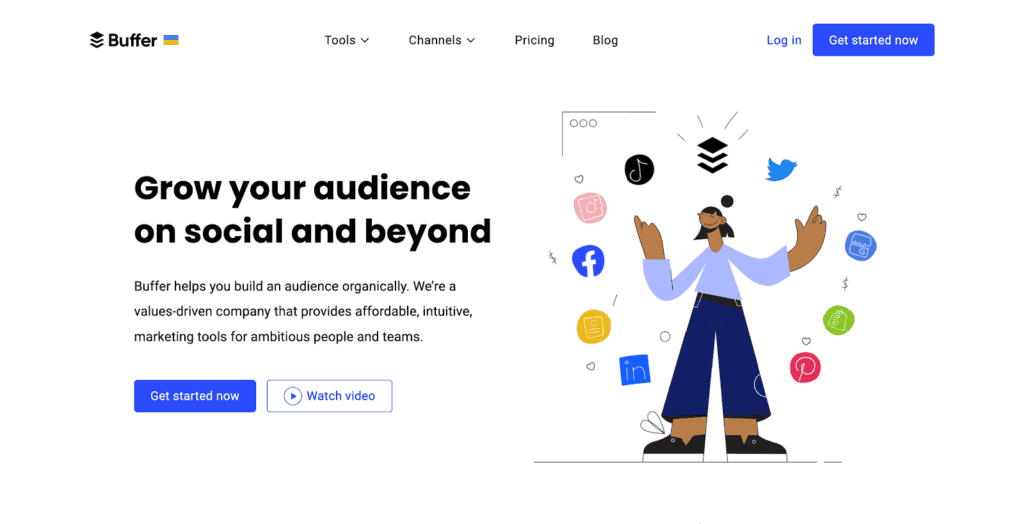
With Buffer, you’ll have maximum control of your social media networking. This platform allows you to fully manage your marketing strategy on various platforms. The interface is clean and easy to use. Even with its simple UI, Buffer is feature rich.
With Buffer, you can easily manage multiple social media accounts, customize post days and times and schedule posts via the queue for specific days. Its stripped UI makes this process even quicker. There’s no fumbling around. Buffer offers seamless interaction, multiple accounts management and posting that even novices can grasp.
Further, their customer support is excellent. Wait times are low and they’re informative and helpful. It’s no wonder Buffer is highly reviewed by users.
Pros:
- Schedule social media posts to various platforms.
- Ability to schedule repeat posts 24/7.
- Create slots and add content.
- Full calendar view.
- Rich Instagram-specific features.
- Team management.
- In-depth analytics and reports.
- Streamlines workload for quicker, more efficient social media marketing.
Cons:
- Lacks features found in other more robust tools.
- Can be a bit buggy with integrations and need to reconnect to networks every so often.
- Analytics are basic.
Pricing: Free for one user, $5/month for professionals with three paid plans, $10/month for teams and $100/month for agencies.
Best Email Marketing Tools
Email is far from dead. In fact, email marketing is one of the most crucial small business tools today.
Email marketing platforms allow small business owners to build a strong, steady and loyal customer base. Email campaigns help you create an effective digital marketing strategy for your latest and greatest product or service.
Pro Tips
For the best use of these tools, get documented on how you are able to use emails to grow your business. Understanding the importance of email marketing and how it can help you is essential.
Decide whether you want to create and build email marketing campaigns to launch products or services. Decide how much customizability you want and how far you want to scale. From there, pick the tool that best fits your needs and budget.
Here are my top picks for the best email marketing tools for small businesses.
1. Mailchimp
Mailchimp rightly takes its place as one of the best email marketing tools. Small businesses starting out can take advantage of its generous free plan. It’s feature-rich and remains a tried and true tool for marketers worldwide.

The free version of Mailchimp is generous. It includes a feature-rich yet simple interface that neatly integrates everything you need to reach your email marketing goals. The template editor is impressive, allowing you to customize how your emails look. Mailchimp’s thorough reporting enables you to view clients, gro-tracking and much more. Further, with seamless social media and Google Analytics integration, you’ll get detailed reports on performance.
There are endless integration options. And Mailchimp continues to expand. If you’re a small business looking for a comprehensive, easy-to-use email marketing campaigns app, you needn’t look any further than Mailchimp.
Pros:
- Organically build your email subscriber list.
- Schedule and send personalized emails.
- A content studio to create a dynamic email content marketing strategy.
- Smart recommendations and testing for continuously improved results.
- Customer journeys for better engagement.
- Generous free plan.
Cons:
- No email scheduling option on the free plan.
- Not usable for affiliate marketing.
- For email and chat support, you’ll need to upgrade to a paid version.
Pricing: 1 user for free. 3 users billed at $13/month. 5 users billed at $20/month. Unlimited users billed at $350/month. The number of features increases with each plan.
2. ConvertKit
ConvertKit is an effective tool for creating deeper relationships with your customers. While it doesn’t have the scheduling features of Mailchimp, ConvertKit isn’t as limiting. For example, ConvertKit allows small businesses to send an unlimited number of emails and use as many registrations as they like.
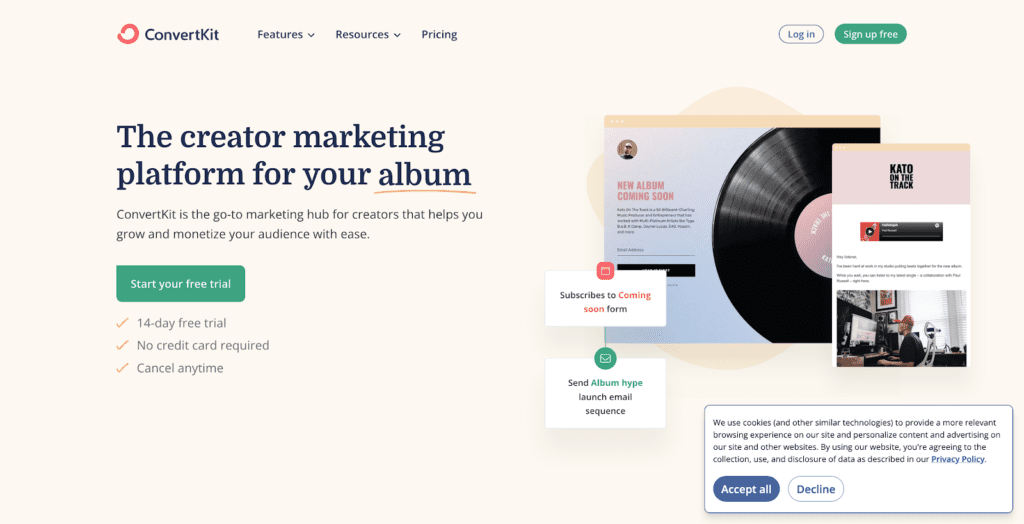
With Convertkit, small businesses become content creators. This software is designed to help you create real connections with your audience. It’s user-friendly, includes powerful automation and tagging and can incorporate powerful integrations.
At the forefront of Convertkit is the ability to effectively manage and automate emails. At the end of the day, it’s these basics that small businesses need and what Converkit offers. For its free and paid pricing, Convertkit is generous. Whether you’re starting on the email campaign front or you’re an experienced email marketer, Convertkit will help you reach, connect and retain a growing audience with ease.
Pros:
- Aimed at and great for e-commerce businesses.
- Unlimited emails, registrations, forms and more — even for free users.
- Great live chat support.
- Easy automation creator.
- Detailed data reporting.
- Helps build personalized, deep and lasting customer relationships.
- Low-cost, simple tier plans.
Cons:
- No advanced template customization.
- Automation can be confusing.
Pricing: Free for new creators. $9/month for creators beginning to automate their work. $25/month for pro creators scaling their business.
Need help implementing your email marketing?
Find a freelancer on Fiverr!
Best Analytics and Reporting Tools
Analytics tools enable marketers to analyze, monitor and compare performance across multiple channels. With analytics tools, you can view the impact of your marketing channels such as organic search and social media. They provide deeper insight into what’s working and what’s not
Measuring the Success of Your Marketing Efforts
What gets measured gets managed. It’s paramount that you track, analyze and follow the data reported. Your digital marketing campaign requires the right tools, insights and strategy to be successful. Measuring and improving upon business metrics is key to a growing, scalable business.
Here are some of the most important major metrics to measure:
- Total website visitors.
- The number of visitors vs. the number of return visitors.
- Mobile traffic.
- Interactions per visit.
- Engagement rate.
- Bounce rate.
To measure these metrics, you need the right analytics and reporting tools. They enable your business to generate up-to-date snapshots of business areas that demand attention.
Pro Tips
For the best use of these tools, have a plan of how you can use data insights to improve your business. Know which platforms you need data insights from. For example, decide whether you want data analytics from social media, email, your website and anything else. Learn to use digital analytics to guide business decisions that positively affect your outcomes.
Focus on the key metrics that matter to your business. Since this can be time-consuming and technical, having a dedicated support team can help.
Use the relevant analytics and metrics reported to see what’s working and what isn’t. Hone in on what does. Prioritize and change what doesn’t. It’s a good idea to save data logs to track performance over time. This way you can look back and see how changes made to your digital marketing strategy affect your outcomes.
Here are my top picks for the best analytics tools for small businesses.
1. Google Analytics
Google Analytics helps you glean greater insight into how your customers engage with your business. From this insight, you can deliver better experiences and drive greater results. Google Analytics provides detailed insights aimed at improving your ROI.
Its power lies in being created by Google. Google is the gatekeeper in many ways. They monitor and alter search engines and what gets noticed. The fact that it is free is a big plus.

While Google Analytics may seem rather simplistic, the easy-to-use interface is an attractive asset for many small businesses. As one of the best free tools for website traffic analysis, it’ll help you establish effective marketing through various channels.
Further, Google Analytics helps users map user behavior and their journey, even down to the location and device level. These insights give small businesses the upper hand by helping to identify sets of actions users perform before making a purchase.
Overall, Google Analytics is about understanding your target market’s psychology. For a free tool, it’s extremely powerful and useful for small businesses.
Pros:
- Understands customer behavior through data.
- Can predict customer behavior and trends.
- Target audience marketing.
- Ad personalization.
- Helps improve search SEO.
- Thorough keyword research.
Cons:
- Only provides basic level analysis and lacks the detailed information some users need.
- Traffic numbers through certain channels can be inaccurate.
Pricing: Free.
2. BuzzSumo
BuzzSumo allows you to find and create the best content for your business. It benefits from being the world’s largest bank of social and content marketing engagement data.
The data this tool generates allows for greater insight into how to improve your digital marketing efforts. This powerful tool will help you generate ideas, create high-performing content and better understand your target audience.

BuzzSumo is used by millions of marketers worldwide. It’s an all-in-one marketing tool that gives you the content research and performance insights your small business needs to grow.
It’ll gather data from across social media. It’ll provide large-scale content analysis. It’ll scan influencers, trending news and media alerts. It does all this and more in one simple platform.
BuzzSumo pulls from the largest index of user engagement data on offer. This way, you get the most accurate data and performance insights possible. This is where it truly stands out amongst the rest. With BuzzSumo, you can create effective content that performs optimally.
Pros:
- Rich digital analytics.
- Insight into performing keywords for better search engine optimization (SEO).
- Measures the number of social shares and backlinks.
- Event management.
- Content marketing tools.
- Email marketing tools.
Cons:
- Starting price is very high compared to other marketing tools.
- Lacks some features that users might expect for the high starting price point.
Pricing: $99/month for five users, $179/month for ten users, $299/month for 15 users. Includes a 30-day free trial.
3. Zoho Analytics
Zoho Analytics is a powerful reporting tool that helps you better analyze your business data. It can pull key metrics, show you in visual form and makes for easy data management.
From the data derived, you’ll be better equipped to make beneficial business decisions. It’s powerful, intelligent and easy to use.
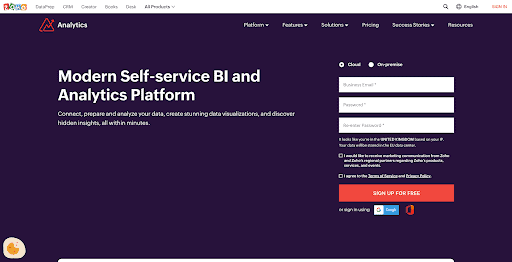
With all the powerful data and insights Zoho Analytics provides, you’ll be better equipped to drive informed decision-making. Users of any skill level can create and share reports. It’s robust and supports a wide range of integrations and formats.
It supports rich spreadsheets and data sheet integrations. You can also push data from any application. You can even analyze data collaboratively when you need that extra keen eye to help you make the best data-driven decisions for your next big marketing move.
Pros:
- Simple drag-and-drop user interface (UI).
- Easy spreadsheet viewing of metrics.
- Reporting and collaboration.
- Data visualization.
- Centralized data collection.
- Data preparation and management.
- Supports many file formats.
Cons:
- The advanced tools can be difficult to understand.
- The UI is not as streamlined as some other marketing tools.
Pricing: The basic plan for two users billed at $19/month. The standard plan for five users its $39/month. The premium plan for 15 users is $92/month. The enterprise plan for 50 users is $369/month. Includes a 15-day free trial.
4. ClicData
ClicData is a completely cloud-based reporting tool. This powerful tool comes with a data warehouse for deep, accurate insights into your metrics performance. It’s feature-rich and great for small business owners.
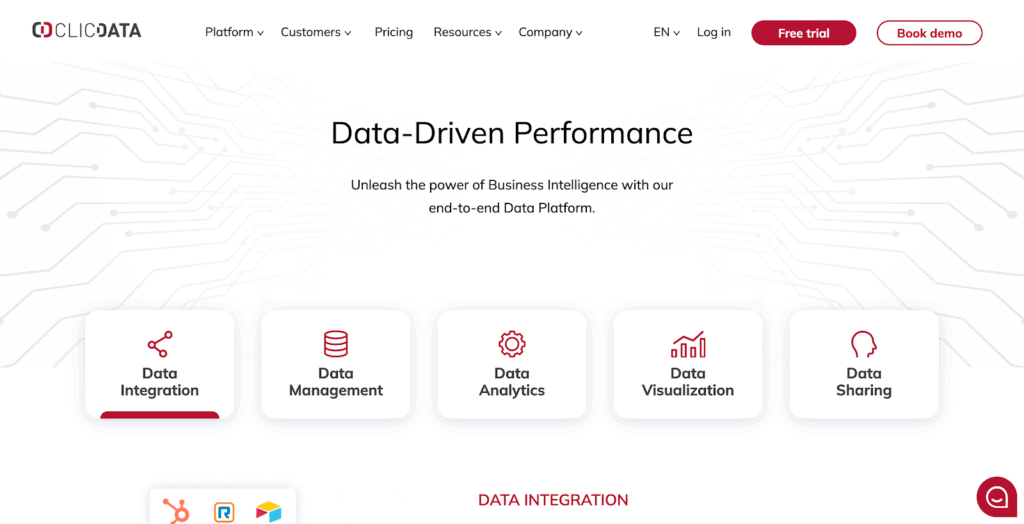
ClicData is an intuitive, cloud-based business intelligence solution that makes performance tracking easy. With ClicData, your business can master its data destiny. This platform will create dashboards designed for particular data set viewing. This unique feature allows for the compartmentalization of your important data for easy viewing.
Further, with ClicData, data sharing and collaboration are easy. Reports can be emailed, pushed to the web or shared through social media.
Pros:
- Quickly pulls data from various sources for richer reporting.
- Generates reports and dashboards in a simple drag-and-drop UI.
- Cloud-based for easy access anywhere.
- Full mobile integration.
- Get access to your latest sales reports in a flash.
- Reports can be sent by email, pushed to the web or shared through social media.
Cons:
- Expensive starting prices for some businesses.
- Steep learning curve due to many visualization and customizability options.
- Many reports of freezing and bugs.
Pricing: 14-day free trial available. Comes in standard and enterprise tier levels. Standard comes in personal billed at $85/month, team billed at $275/month and business billed at $535/month. Enterprise prices are tailored depending on business needs.
Using and Benefitting from the Best Digital Marketing Tools
As a small business, your marketing strategies are propelled with the right tools. Online marketing tools can drastically improve small business marketing.
Whether it’s social media, email marketing, or using powerful analytics and reporting tools to improve your digital marketing strategy, there are many tools at your disposal. From reporting marketing analytics to improving marketing activities to creating a sound SEO strategy, digital marketers use these best digital marketing tools every day to grow and scale businesses.
If you don’t have a digital marketing team, it can be time-consuming. The learning curve on some of these tools can be steep. To find the right tools for your small business, you need to experiment with the options available — many of which I’ve listed.
Save Time and Effort With An Expert on Your Side
But you can save time and effort working with an expert marketing consultant. They can narrow down and choose the most appropriate tools for your small business. What’s more, they already have these tools at their disposal and know how to wield them best.
As a marketing coach, I help businesses achieve maximum results in their digital marketing efforts. I provide marketing consulting, coaching and branding services and much more.
I help small business owners every day grow and scale their businesses to newfound heights. Together, we can identify the right digital marketing tools for your specific requirements.
Schedule a free consultation and reach out to me today.
FAQs about Digital Marketing Tools for Small Business
How Can a Small Business Use Digital Marketing?
Digital marketing for small businesses includes a variety of methods. Digital marketing for small businesses includes, but isn’t limited to, social media marketing, email marketing, paid ads, content marketing and more.
How Do Marketing Tools Benefit Small Businesses?
Marketing tools can benefit small businesses through various means depending on the type of marketing it’s created for. For example, a social media marketing tool can aid a business in social media management and the promotion of products and services on its platforms. Marketing tools help businesses improve their marketing efforts.
What is the Best Marketing Platform for Small Businesses?
The best marketing platform for small businesses is the one that best fits the business’s requirements. Businesses should plan and take notes on what aspects of digital marketing they’ll need to use. For example, if a business will be heavily focused on email marketing, using a great email marketing platform such as Mailchimp is a good idea.

